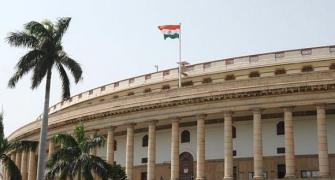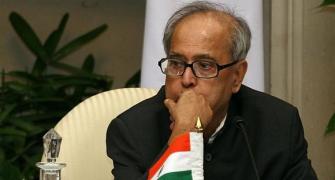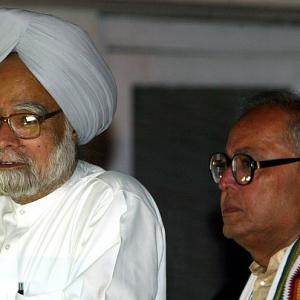For the first time since the winter session of Parliament commenced over two weeks ago, there was cautious optimism in ruling circles that both the Houses may transact business on Wednesday, December 7, following the government's climbdown on 51 per cent foreign direct investment in multi-brand retail.
Deferring to the Opposition's wishes, the government has called an all-party meet on Wednesday morning to spell out its latest stand, to put in abeyance its FDI-in-retail decision till a consensus can be arrived at on the issue.
Finance Minister Pranab Mukherjee is expected to make a statement to this effect at the all-party meet. In any case, he had informed the meeting of all parties last week that he would consult with the prime minister on the issue and get back to them.
The Opposition parties, which have been demanding a rollback of the policy decision, have been of the view that only an oral assurance by the government will not be enough. Unless it can put its decision on hold 'formally,' it can at any time notify it, once the Parliament session is over, the policy decision already having been taken by the Cabinet.
To address the apprehensions of the Opposition parties, the prime minister is expected to formally approve the suspension of the decision, taking recourse to Rule 12 of the conduct of government business rules.
This allows the prime minister to sanction any proposal, and it gets ratified by the Cabinet afterwards.
The Union Cabinet will meet on Wednesday evening and is expected to give its approval to the move to put the decision on hold till the government can arrive at a consensus.
So far, there has been no case of the Cabinet ever having turned down the sanction accorded by the prime minister.
Parliamentary Affairs Minister Pavan Bansal was upbeat on Tuesday evening that the two Houses would be able to resume their normal functioning and that after the all-party meeting and a statement by Mukherjee, Question Hour would be allowed.
If that happens, the Lok Sabha is expected to take up the discussion on price rise. When asked by Rediff.com about the implications of Mukherjee reaching out to Leader of Opposition Sushma Swaraj and Communist Party of India-Marxist leader Sitaram Yechury, informing them about the government's resolve to put the FDI-in-retail decision on hold, Bansal said, "Suppose an agreement is reached, on what basis will the Opposition continue to obstruct the House? Then the Houses should run smoothly, and take up the 31 legislative proposals they were expected to."
What if the Opposition decided not to play ball? "If they don't, it would be very unfortunate. It would only show that their purpose is to keep Parliament non-functional all the time, which would render the parliamentary system irrelevant."
But the minister added quickly, "I don't expect that to happen. I am confident because the Opposition also recognises their responsibility which is a joint one."
The upshot of the government's 'formal' climbdown is that it will not be able to take up the issue again in the near future, certainly not till after the forthcoming assembly elections in Uttar Pradesh and four other states.
And even after that, it will have to consult the stakeholders, particularly its allies like the Trinamool Congress which forced it to backtrack.
It may also have to further tweak the policy as it was passed and may have to lower the percentage of FDI in retail.
It goes without saying that the government's handling of the issue -- this was after all an international story -- has dented its authority and the prime minister's image. But Trinamool leader and West Bengal Chief Minister Mamata Banerji's unyielding opposition, the compulsion to run Parliament, and unhappiness in the Congress ranks about the bad timing of the decision -- party president Sonia Gandhi has maintained a studied silence on the issue instead of lending it her support -- compelled the government to beat a hasty retreat.
Swaraj and Yechury both insisted that Mukherjee first evolve a consensus at the all-party meet on Wednesday and on the basis of that consensus, he should make his statement in Parliament.
Though the Opposition parties have not allowed Parliament to function for the last two-and-a-half weeks, they also realise that din and disruptions, beyond a point, are not going down well with people. For that reason they may try to come across as wanting to act reasonably.
"If all parties are not taken into confidence, how can the NDA (EM>National Democratic Alliance) give an assurance that the House would function smoothly?" asked BJP leader Yashwant Sinha. "We have made it very clear to the government that it has to roll back (the decision), not put on hold. This is an open issue which has to be discussed at the all-party meet."
Expressing the Opposition's apprehensions, the BJP leader said, "Suppose they bring around Mamata (Banerjee), and issue a notification after the winter session is over, and show us the thumb? They can be up to any trick."
Speaking about the prime minister's earlier assertion made repeatedly that there would be no rollback of the decision, Sinha quipped, "This PM holds firm when he is sure of his numbers. When he is not sure of his numbers, he gives up. This time he miscalculated."
Referring to the 2010 winter session of Parliament which was a washout because the government refused to give into the Opposition's demand for a joint parliamentary committee probe into the 2G scam, which it had finally to concede in the Budget session, Sinha said, "It taught them that they cannot brazen it out. No government can do it throughout the Budget session (and survive)."
Meanwhile, Bansal expressed confidence that the Lok Pal Bill would be passed in the winter session of Parliament.
Spelling out its timelines, the minister for parliamentary affairs said, "The standing committee's report is likely to be presented this Friday. After that the law ministry would take a few days to frame official amendments, which would be presented to the Cabinet for clearance, and then the Bill would be brought to the Lok Sabha and the Rajya Sabha and passed. We hope to clear it in this session. What will be its shape, it is for the Houses to decide."
And yet, for all its brave words and cautious optimism, at the end of the day, the government is keeping its fingers crossed.
The Congress has issued a whip to its members to be present on December 7 and 8, and the BJP has done likewise for its members to be present for the next three days, lest there be an unexpected vote.
The government is hoping to pass the supplementary demands for grants, as part of the mandatory financial business, in the next couple of days, lest Parliament go for a toss under one pretext or another.








